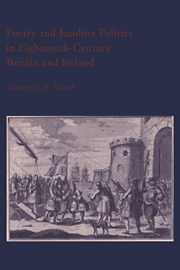Book contents
- Frontmatter
- Contents
- Acknowledgements
- Introduction
- 1 Invasion and xenophobia
- 2 The wee, wee German lairdie
- 3 The codes of the canon
- 4 Jacobite political culture in Scotland
- 5 Jacobite culture in Ireland and Wales
- 6 The demon's light
- 7 The tartan curtain
- Additional works
- Index
- CAMBRIDGE STUDIES IN EIGHTEENTH-CENTURY ENGLISH LITERATURE AND THOUGHT
1 - Invasion and xenophobia
Published online by Cambridge University Press: 23 November 2009
- Frontmatter
- Contents
- Acknowledgements
- Introduction
- 1 Invasion and xenophobia
- 2 The wee, wee German lairdie
- 3 The codes of the canon
- 4 Jacobite political culture in Scotland
- 5 Jacobite culture in Ireland and Wales
- 6 The demon's light
- 7 The tartan curtain
- Additional works
- Index
- CAMBRIDGE STUDIES IN EIGHTEENTH-CENTURY ENGLISH LITERATURE AND THOUGHT
Summary
The breaking image
Thus was Life's Sacred Tree of old
Committed to a Guardian Angel's Care …
Thrice happy James, whose First Year's Reign
Hath brought Astraea back to Earth again!
Joshua BarnesTo be sure we may say with Vergilius Maro,
Fuimus Troes.
The Baron of BradwardineOn 5 November 1688, fifty years after the National Covenant had been signed in Edinburgh, William of Orange landed in England. His coming brought full circle Fortune's wheel which had deposed one Stuart through the fanaticism of the northern kingdom, and now evicted another by the fear and apathy of the southern realm.
Like so many patterns of recurrence, this description is too simple to stand as linear history. But to the Stuarts, and to this book which is an explanation of the poetry and ideology of their cause, such a reservation is redundant. For the Stuart cause (and on occasion, the ambition of its kings) was habitually expressed in a language of typology, with metaphors of prophecy and recurrence-salvation history, and not without its messianic force. This offered a profound and rich political analysis of the realms they had lost, won and lost again in the course of half a century. It was also a tongue which, increasingly after 1688, betokened the exclusion it lamented.
- Type
- Chapter
- Information
- Publisher: Cambridge University PressPrint publication year: 1994
- 1
- Cited by

